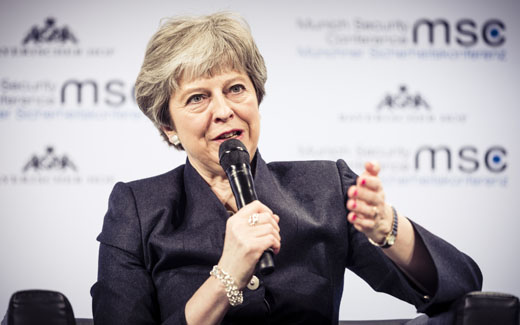FPI / May 8, 2020
Commentary by Lee Cohen
Many world leaders including those in the U.S., the UK, and Australia are calling for inquiries and punitive actions against what British author Charles Moore calls “a Chinese system of governmental, scientific and intellectual control whose secretiveness and mendacity have created the most sudden and widespread health crisis in history.”
However, this week, former UK Prime Minister Theresa May emerged in a major column to depart from these views, resorting instead to calling for moral equivalence in dealing with the U.S. and China.

May argues that maintenance of strong international relations and global action should be prioritized, instead of nations dealing with issues alone: “A highly infectious novel virus, life-threatening for many, might seem to be just the sort of thing countries would want to work together on. Instead, it has been treated as a national issue for countries to deal with alone.”
She also rails against “Nations with no allegiance to democratic values displayed a growing assertiveness, just as the western alliance seemed to be in decline,” citing China and the U.S.
Moreover, May takes a swipe at what she perceives is the global environment in which the pandemic hit: a populist driven approach to economic and social challenges that “views the world through a prism of winners and losers and sees compromise and co-operation as signs of weakness.” She says this landscape sacrifices “short-term benefit for the greater good.” She qualifies further: “a world in which a few ‘strong men’ square up to each other and expect everyone else to choose between them.”
May criticizes what she perceives as a U.S. approach of aggressively pursuing China in such a way that it becomes “a fault line in international relations.” By contrast, her remedy is “to engage with China to ensure that it adopts higher standards on intellectual property, carbon emissions, human rights, and regional security.”
In a dig to President Donald Trump’s efforts to effect change of international organizations by denying funding, May suggests: “any frustrations we have about the performance of institutions like the World Health Organization should be channeled into reforming them, not denigrating the concept of international co-operation.”
Mrs. May’s narrative of “our great multilateral institutions” seems at odds with other widely-held views, considering the failures of EU and WHO to address the needs of their stakeholders. The EU neglected to address calls for financial and medical equipment, and even to agree on uniform policy for its member states. Likewise, the collusion of the WHO in China’s dishonesty continues to be widely recognized.
May’s view seems to be out of step, not only with many world leaders’ but with those in her own nation’s government. During Boris Johnson’s hospitalization with coronavirus, his deputy, Dominic Raab said there would be no return to “business as usual” with China. Efforts have been underway for legislation from Johnson’s Tory Party to block Johnson’s commitment to using China telecom giant, Huawei’s equipment in building out the UK’s 5G network due to high risk to national security and intelligence.
One of the legislation’s authors, Ian Duncan Smith, MP departs completely with May’s arguments. Smith wrote last month of the Chinese, “It is vital that we change all that and break our dependence on this terrible regime.” He went further to recommend imposition of financial reparations. Smith concluded: “We also need to ensure that China doesn’t exploit its economic power to avoid taking responsibility for this appalling pandemic. Working with other allies, we have to ensure that we never allow such an autocratic regime, one that abuses human rights and ignores the rules-based international order, to become so dominant again.”
Theresa May achieved notoriety in her failure to lead Britain out of the European Union after the British people indicated their desire to do so. Many, such as Brexit Party Founder Nigel Farage expressed that Mrs. May was ill-prepared to accomplish that mission in that she was a globalist who inherited a nationalist mission to take back Britain’s sovereignty, and that this contributed significantly to her downfall. Her column criticizing President Trump’s approach, as well as favoring a globalist approach to problems solving over a national one, seems to corroborate that view.
Intelligence Brief __________ Replace The Media
